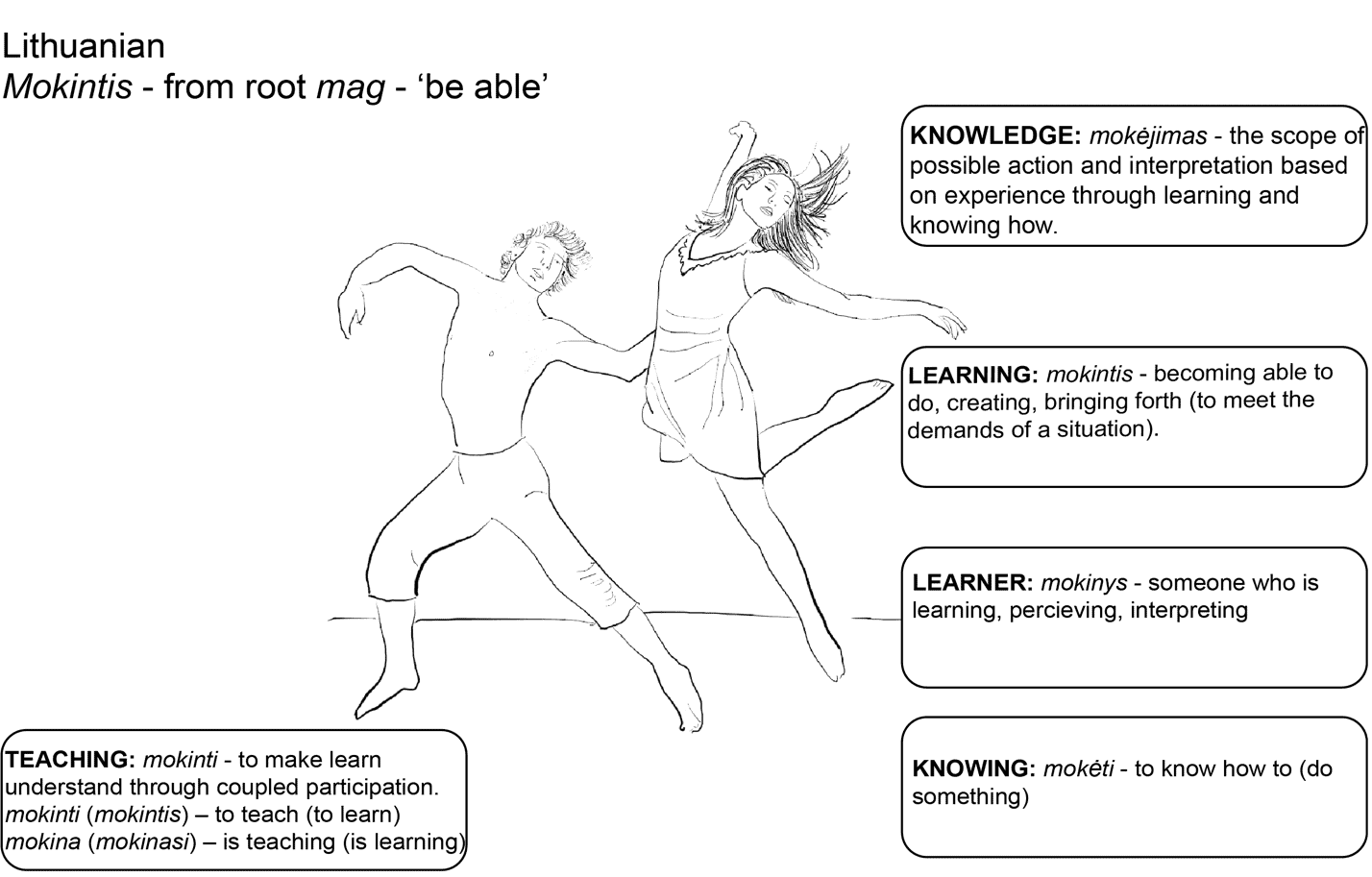Root Metaphor
Moku - be able, effortIllustrative Example of Root Metaphor

Etymology
The starting point for the stem mok- is likely the root mag – ‘be able’ which was phonetically modified when followed by the suffixes -ti, -to1. The etymology of mokintis comes from móku – ‘mokėjau which means to ‘know how to do’, ‘be knowledgeable about’, ‘be proficient’. It is similar to the Latvian word mâcêt meaning ‘be able.’ Mokintis or mokytis involves a person’s effort to learn a new capability or skill. The syllable -in-, when used in a verb, adds reflexivity to it. The reflexive verb (lot. reflexivus) points to a subject taking a certain action (and is limited only to that particular subject taking that particular action). The syllables -jimas or -inys are used to create nouns based on verbs.Common phrases of learning and teaching
Common phrases about learning
- Gebėjimas mokytis svarbus jau vaikystėje – The skill to learn is important already in childhood.
- Mokslo šaknys karčios, o vaisiai saldūs – The roots of learning are bitter, but the fruit is sweet.
- Turi išmokti juos suprasti - You need to learn to understand them
- Mokytis naujų dalykų niekada nevėlu – It is never too late to learn new things.
Common phrases about teaching
- Ši pamoka man įstrigo visam gyvenimui – This lesson has remained in my mind for life.
- Gyvenimas moko suprasti kitus – The life teaches how to understand others.
- Mano kolega darbe yra geriausias mano mokytojas – My colleague at work is my best teacher.
Common phrases about knowledge
- Geriausiai yra mokytis iš svetimų klaidų – It is best to learn from others’ mistakes.
- Jo mokėjimas rasti sprendimą jam padėjo išvengti bėdos – His knowledge to find a way out has helped him avoid trouble.
- Mano tėčio žinios pravertė man statant savo namą – My father’s knowledge has helped me in building my own house.
- Žinių siekimas turėtų būti nuolatinis žmogaus uždavinys – Seeking new knowledge should be a continuous task for anyone.
- Neužtenka tik mokėti, svarbu imtis veiksmų ir daryti – It is not enough to know things, it is important to put the knowledge into practice.
Commentary
Lithuanian is one of the oldest and most difficult Indo-European languages. Linguists mistakenly lump the Baltic and Slavic languages together. The Baltic branch is a distinct and separate group of languages and are presently confined to Lithuania and Latvia. With its ancient dialects, Lithuanian is similar to Sanskrit, as well as Greek and Latin. As such, Lithuanian is a spoken remainder of the old Indo-European languages1. The origins of the word mokintis – moku mean ‘be able’. “Be able’ suggests sensibilities about learning that are consistent with Enactivism, where all knowing is doing and all doing is knowing. While the Lithuanian language may be ancient, their concepts of learning are ahead. The similarities between the words are consistent with the Enactivistism sense of coupled participation: mokinti (mokintis) – to teach (to learn), mokina (mokinasi) – is teaching (is learning), mokino (mokinosi) – has been teaching / has taught (has been learning / has learnt). As such, the teacher is responsible to ensure learning. The root moke is also contained in science mokslas (mokslininkas) – science (a person deep into either science or biography or literature or studying specific topic). This provides an integrative sense as compared to the English the roots of science as schism – ‘to separate’. Fraenkel (1962)2 provides the following insights (as translated by S. Rothschuh)- One of the related words of the root mokėti is mokyti, and it means teach. It is actually translated with "make learn", in the sense of "make so, that someone understands".
- When used reflexively, the verbs will be mokintis or mokytis. Both mean "learn", and a similar pattern of reflexive usage can also be found in the Slavic verbs uciti se (learn) and uciti (teach). As far as I (Stefan Rothschuh) know, a reflexive verb has an object that is the same as the subject, meaning the action of the reflexive verb is something one is doing to or for oneself. In terms of mokintis/mokytis, this may imply that the learner is teaching oneself/making oneself understand.
- In Latvian (which is related), macities means learn, and macit means teach.
- There is also a connection to the (Old) Prussian language, whereby mukint means teach. Similarly, the reflexive verb is used to express learn, i.e., mukinnimai (we learn) and mukinseisin (he learns).
- The Lithuanian mokėti and their related forms, as well as the Latvian and Old Prussian equivalents, are all related to the Greek word uāꭓoƽϛ, which means aid or support, as well as uāꭓavá , which means tool, artifice, skill, or trick.
- There is also a connection to the (Old) Prussian language (which I am pretty sure is not spoken anymore), whereby mukint means teach. Similarly, the reflexive verb is used to express learn, i.e., mukinnimai (we learn) and mukinseisin (he learns)
- Svarbu mokėti išsakyti savo nuomonę – It is important to know how to express your own opinion.
- Sąskaitas už paslaugas turiu mokėti kiekvieną mėnesį – I have to pay my service bills each month.
Implicit Spatial Associations
The root moku (be able) is present in teaching learning, learner, knowledge and knowing, suggesting coupled participation with each: mokinti (mokintis) – to teach (to learn), mokina (mokinasi) – is teaching (is learning), mokino (mokinosi) – has been teaching / has taught (has been learning / has learnt).1 Dobilas, C. (2014). Did Adam & Eve speak Lithuanian? Lithuanian Heritage (September/October). p 22-24.
2 Fraenkel, E. (1963) Litauisches etymologisches wörterbuch, Satz und Druck.
Please cite this article as:
Francis, K., Davis, B., Rothschuh, S., Slay, S. & Smaizys, P. (2020). “Mokintis" (Lithuanian). Metaphors of Learning in Different Languages. https://doi.org/10.11575/8B7N-V637. https://learningmetaphors.com
⇦ Back to Map
⇦ Back to List
